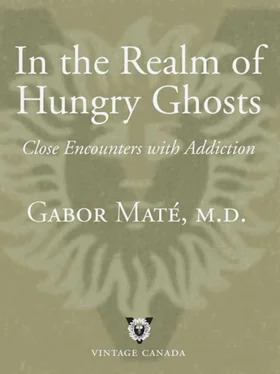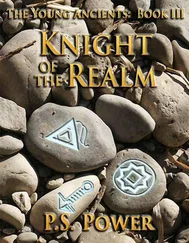
At heart, I’m not that different from my patients, and sometimes I cannot stand seeing what little psychic space, what little heaven-granted grace, separates me from them —so I wrote in the first chapter. There are moments when I’m revolted by my patients’ dishevelled appearance, their stained and decayed teeth, the look of insatiable hunger in their eyes, their demands, complaints and neediness. Those are times when I would do well to examine myself for irresponsibility in my own life, for self-neglect—in my case not so much physical but spiritual—and for placing false needs above real ones.
When I am sharply judgmental of any other person, it’s because I sense or see reflected in them some aspect of myself that I don’t want to acknowledge. I’m speaking here not of my critique of another person’s behaviour in objective terms but of the self-righteous tone of personal judgment that colours my opinion. If, for example, I resent some person close to me as “controlling,” it may be owing to my own inability to assert myself. Or I may react against another person because she has a trait that I myself have—and dislike, but don’t wish to acknowledge: for example, a tendency to want to control others. As I mentioned in a previous chapter, some mornings I vituperate about right-wing political columnists. My opinion remains more or less constant: their views are based on a highly selective reading of the facts and rooted in a denial of reality. What does vary from day to day is the emotional charge that infuses my opinion. Some days I dismiss them with intense hostility; at other times I see their perspective as one possible way of looking at things.
On the surface, the differences are obvious: they support wars I oppose and justify policies I dislike. I can tell myself that we’re different. Moral judgments, however, are never about the obvious; they always speak to the underlying similarities between the judge and the condemned. My judgments of others are an accurate gauge of how, beneath the surface, I feel about myself. It’s only the wilful blindness in me that condemns another for deluding himself; my own selfishness that excoriates another for being self-serving; my lack of authenticity that judges falsehood in another. It is the same, I believe, for all moral judgments people cast on each other and for all vehemently held communal judgments a society visits upon its members. So it is with the harsh social attitudes toward addicts, especially hardcore drug addicts.

“What characterizes an addiction?” asks the spiritual teacher Eckhart Tolle. “Quite simply this: you no longer feel that you have the power to stop. It seems stronger than you. It also gives you a false sense of pleasure, pleasure that invariably turns into pain.” 1
Addiction cuts large swaths across our culture. Many of us are burdened with compulsive behaviours that harm us and others, behaviours whose toxicity we fail to acknowledge or feel powerless to stop. Many people are addicted to accumulating wealth; for others the compulsive pull is power. Men and women become addicted to consumerism, status, shopping or fetishized relationships, not to mention the obvious and widespread addictions such as gambling, sex, junk food and the cult of the “young” body image. The following report from the Guardian Weekly speaks for itself:
Americans now [2006] spend an alarming $15 billion a year on cosmetic surgery in a beautification frenzy that would be frowned upon if there was anyone left in the U.S. who could actually frown with their Botox-frozen faces. The sum is double Malawi’s gross domestic product and more than twice what America has contributed to AIDS programs in the past decade. Demand has exploded to produce a new generation of obsessives, or “beauty junkies.” 2
Beauty Junkies is the title of a recent book by New York Times writer Alex Kuczynski, “a self-confessed recovering addict of cosmetic surgery.” And, with our technological prowess, we succeed in creating fresh addictions. Some psychologists now describe a new clinical pathology—Internet sex addiction disorder.
Physicians and psychologists may not be all that effective in treating addictions, but we’re expert at coming up with fresh names and categories. A recent study at Stanford University School of Medicine found that about 5.5 per cent of men and 6 per cent of women appear to be addicted shoppers. The lead researcher, Dr. Lorrin Koran, suggested that compulsive buying be recognized as a unique illness listed under its own heading in the Diagnostic and Statistical Manual of Mental Disorders, the official psychiatric catalogue. Sufferers of this “new” disorder are afflicted by “an irresistible, intrusive and senseless impulse” to purchase objects they do not need. I don’t scoff at the harm done by shopping addiction—I’m in no position to do that—and I agree that Dr. Koran accurately describes the potential consequences of compulsive buying: “serious psychological, financial and family problems, including depression, overwhelming debt and the breakup of relationships.” 3But it’s clearly not a distinct entity—only another manifestation of addiction tendencies that run through our culture, and of the fundamental addiction process that varies only in its targets, not its basic characteristics.
In his 2006 State of the Union address, President George W. Bush identified another item of addiction. “Here we have a serious problem,” he said. “America is addicted to oil.” Coming from a man who throughout his financial and political career has had the closest possible ties to the oil industry, this stark admission might have been transformational. Unfortunately, Mr. Bush framed the problem purely in geopolitical terms: the U.S. finds itself dependent on a resource from abroad, a resource that “the enemies of freedom” would deny its citizens. Hence, the country needs to develop other sources of energy. So the problem is not the addiction itself, only that the supply of the substance in question may be jeopardized: typical addict’s logic, of course.
Whether we tally health expenditures, loss of human life, economic strain or any other measure, the “respectable” addictions, around which entire cultures, industries and professions have been built, leave drug addiction in the dust.
We’ve already defined addiction as any relapsing behaviour that satisfies a short-term craving and persists despite its long-term negative consequences. The long-term ill effects of our society’s addiction, if not to oil then to the amenities and luxuries that oil makes possible, are obvious. They range from environmental destruction, climate change and the toxic effects of pollution on human health to the many wars that the need for oil, or the attachment to oil wealth, has triggered. Consider how much greater a price has been exacted by this socially sanctioned addiction than by the drug addiction for which Ralph and his peers have been declared outcasts.
And oil is only one example among many: consider soul-, body-or Nature-destroying addictions to consumer goods, fast food, sugar cereals, television programs and glossy publications devoted to celebrity gossip—only a few examples of what American writer Kevin Baker calls “the growth industries that have grown out of gambling and hedonism.” The metropolis of gambling and hedonism, Las Vegas, received nearly 40 million visitors in 2006, and its local population base has increased by 18 per cent since 2000. The highest-grossing independent restaurant in the U.S. is the Tao Las Vegas. It features seminaked women, gaming consoles, poolside plasma TV screens, preprogrammed iPods, all amid a “proliferation of Buddhas, pulsating music and sensuous décor.” 4I doubt either owners or customers are alive to the absurdity of co-opting the Tao, the ancient Chinese wisdom path of nonattachment and surrender, to support addiction, or of using images of Buddha, the teacher of serene mindfulness, to shill food, liquor and games of chance.
Читать дальше













